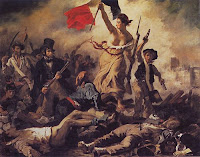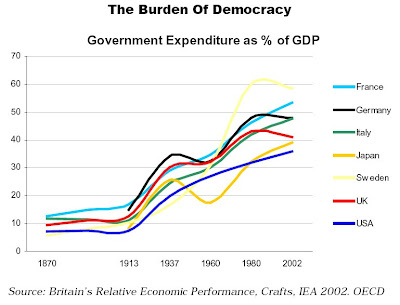Today, I intend to outline a number of proposals Smith makes in this sequel paper, Restoring Liberties.

It should be noted that Smith proposes these as points for discussion rather than suggesting that any or all should or would be adopted. This is understandable. Untrammelled democracy is a seductive system, as Mill himself noted when he argued that “The disposition of mankind, whether as rulers or as fellow citizens, to impose their own opinions and inclinations as a rule of conduct on others…is hardly ever kept under restraint by anything but want of power.” I have lost count of the number of people I have spoken to who are openly willing to force people to behave in a manner that will supposedly save them from themselves. A universal smoking ban and forced exercise camps are just around the corner.
Nonetheless, with organisations such as Direct Democracy agitating for a constitutional convention, and even the Government suggesting that we might actually begin to consider looking into going about wondering how to get together and discuss drafting a written constitution for the United Kingdom, now seems a good time to set out some thoughts for how to limit the power of the state and strengthen the protection of the individual.
 He begins with the most obvious: a written constitution. The very first thing that must appear in a written constitution are rules on how the constitution itself can be amended. This is not small matter, as our current (un-codified) constitution can be changed at will by a simple majority of the two houses of parliament – indeed, probably by a resolute simple majority of just the lower house. Regional devolution and Lords reform may both have been welcome, but they nonetheless represent enormous constitutional change, and yet were required to meet only the same level of assent as a change in the motoring laws. The same is true of every European treaty that has been signed. One may fail to rest, far from assured that Gordon Brown’s newly proposed constitutional changes will be similarly enacted by a simple majority of perhaps just one house.
He begins with the most obvious: a written constitution. The very first thing that must appear in a written constitution are rules on how the constitution itself can be amended. This is not small matter, as our current (un-codified) constitution can be changed at will by a simple majority of the two houses of parliament – indeed, probably by a resolute simple majority of just the lower house. Regional devolution and Lords reform may both have been welcome, but they nonetheless represent enormous constitutional change, and yet were required to meet only the same level of assent as a change in the motoring laws. The same is true of every European treaty that has been signed. One may fail to rest, far from assured that Gordon Brown’s newly proposed constitutional changes will be similarly enacted by a simple majority of perhaps just one house.Smith proposes that in future the constitution should require both houses of parliament to pass the change by a two-thirds majority before the proposal is put to a referendum, where again a two thirds majority must support the change. Thus constitutional tinkering will be kept to a minimum, partisan advantage will be prevented, and yet the constitution will be able to develop if change is widely desired.
In addition, he proposes that each House should have a Constitutional Committee to warn parliamentarians to reject unconstitutional law. These should be empowered to refer existing legislation to a Constitutional Court. The establishment of a Constitutional Court would require a fundamental renegotiation of Britain’s membership of the EU, however, as citizens would otherwise be subject to unconstitutional European legislation that the Court could not – under present arrangements – strike down.
The second principle is that there must be absolute limits to the power of the state over individuals. This effectively means a Bill of Rights – though Smith overlooks the fact that this shifts the balance within society from a freedom-based society, where everything is permitted unless it is specifically banned, to a rights-based society where one has rights because one is given them by the constitution. I would therefore finesse Smith’s Bill of Rights by suggesting that it should be a fundamental statement of existing freedoms, should note in the preamble that the list is inviolable but is not exhaustive, and should include as its first clause the principle outlined above that freedom is the norm from which legislation and even the convention deviates.
The specific freedoms Smith identifies (and in brackets my own proposed alternatives, as he uses some terms that are unnecessarily limited) are freedom of speech (expression), movement, religion (conscience, or belief) and property. To these I would add freedom of association. Smith also includes ancient rights such as Habeas Corpus, trial by jury and rules on double jeopardy.
Smith also includes a general point: that government should not restrict activities of individuals that do not harm others or that harm them in a way that is understood and accepted (to permit surgery, boxing and sado-masochism) or is easily avoided (so that non-smokers are understood to be able to leave the room, rather than insisting others not smoke).
The third principle is that the constitution should prevent the tyranny of the majority. While this seems obvious, this is where it gets tricky. Smith supports a second chamber to oversee and review the lower house and the executive and delay their actions. However, he opposes election, fearing that it would merely be another democratic house that would represent a majoritarian view. He therefore proposes some combination from among expert peers (selected by an independent selection committee), indirectly elected peers (nominated by local councils so that they had an indirect mandate but protected regional interests) and citizen-jurors (chosen by lot to serve, as is the case with jury duty).
He also supports the monarchy on the grounds that state occasions cannot be used to flatter politicians, there is an ultimate veto to tyranny and the armed forces are not subject to the Prime Minister. I might add that there is something inherently humbling in the fact that the very first thing a Prime Minister must do is kneel before The State and kiss hands. Finally, he suggests that some far-reaching legislation that might particularly disadvantage minorities should require a larger level of majority (others have suggested two thirds).
He does not propose a directly elected executive; he feels there are enough checks and balances. To this I might add that the popular mandate that a directly elected Chief Executive would have would appear to entrench executive power and majoritarianism rather than limit it. Smith appears to have temporarily overlooked the lesson of his own paper, that democracy can be used to argue that the executive has a mandate from the people.

Fourthly, as well as limits to what Government can do, there should also be limits to how much, so as to restrict the amount of legislation that activist politicians can create. Parliamentary terms should be fixed in length and individual laws should have “sunset clauses”.
Fifthly, government should be accountable. There should be a federal structure with clear delineation of responsibilities; parliamentary oversight should be strengthened (including proper confirmation hearings) and budgets should be transparent, including the publication of costs associated with every policy.
Interestingly, in his comment to my original piece, Bishop Hill suggested that Smith may have missed a trick in limiting parliament with a Bill of Rights. It would be better to define what government may do and – in a reverse of the logic that should apply to humans – everything should be forbidden that is not explicitly permitted. Government, unlike people, should not be born free, nor should it ever be set free.
Smith’s own verdict on his work is bleak: “The vested interests of those who hold power generally disincline them towards any reforms that will reduce their ability to act as they wish.” When he calls for a constitutional convention to discuss a liberal future, he seems to ignore the crucial lesson of his work: that people’s urge to reproach, interfere and dictate is the source of our problems, and is likely to shape a constitutional convention. Before we begin considering a such a convention, we first need to ask what kind of society we want. Do we really want to be free, if it means others are free too? Or would we rather retain the right to coerce others to make them live in a manner that we see fit, even if we must ourselves bear coercion when we find ourselves in the minority?
 When the Americans drafted their constitution, they may have been naïve enough to think that it would not be twisted and mutilated by overweening centralists and activist politicians, but at least they knew what they wanted from society. They wanted the traditional British liberties which free born British men had won over centuries. I am not sure that modern Britains want the same.
When the Americans drafted their constitution, they may have been naïve enough to think that it would not be twisted and mutilated by overweening centralists and activist politicians, but at least they knew what they wanted from society. They wanted the traditional British liberties which free born British men had won over centuries. I am not sure that modern Britains want the same.







